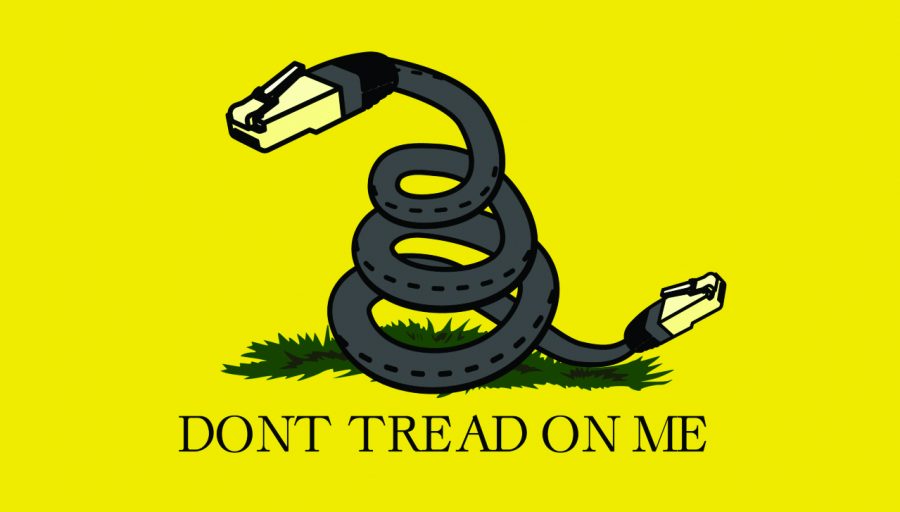How does net neutrality affect you?
The Federal Communications Commission (FCC) plans to vote on Dec. 14 to dismantle net neutrality rules created in 2015.
These rules, established by the Obama administration, were set up to create an open internet where Internet Service Providers (ISPs) are required to give equal access to all legal content without favoring or blocking some sources. It creates an internet where ISPs can’t pick and choose which sites get to certain customers faster or slower.
“The net neutrality rules were first established to ensure that folks had access to internet regardless of their social status,” says Sawyer Alberi, a part-time instructor in the JSC Behavior Science Department. “And to treat the internet as more of a utility rather than an open market.”
But larger ISPs such as AT&T and Comcast argue that net neutrality creates unwanted government meddling that limits competition and reduces incentive for investment and business growth.
“My concern is that by imposing those heavy-handed economic regulations on service providers, big and small, we could end up dis-incentivizing companies from wanting to build out internet access to a lot of parts of the country: low income, urban and rural areas for example.” says FCC Chairman Ajit Pai, in an interview with PBS News Hour’s William Brangham. “And that is something that I think nobody would benefit from.”
By repealing net neutrality rules, the FCC will take control of internet regulations out of government hands and give it to entrepreneurs and big business. According to Pai, this will create a free-market internet that allows ISPs to charge more or less for preferential internet access, and create more competition between providers to spur investment and growth within the market. But there are many who disagree.
“The scary thing is if you give more power to the provider you are definitely going curtail upstarts and businesses that want to try to use the internet because it will be difficult for them to get into the market.” says Michael Dente, Chief Technology Officer of NVU. “You could just start a company right now and hit huge. Another Amazon could come along, but if Amazon is controlling the bandwidth or something then you are in trouble. Then you can’t compete with them.”
Net neutrality treats internet as a utility, grouped with electricity and water, which requires that providers are not allowed to slow some access and hasten others. All consumers have the same access to the same speed internet.
If net neutrality is taken away the fear is that ISPs will have the power to create different tiers of internet speed, and they would be tempted to favor their own sites, services and content over a competitor’s. This creates an environment where ISPs have the ability to throttle internet speeds, censoring what you see, only allowing unthrottled internet access to those who have the ability to pay for it.
So how does all this affect you?
If you are like most US citizens, internet use is a part of your daily life. It is used for everything from paying bills, to accessing news, to watching funny cat videos. Certainly, there are ways to live without the internet, but it is a tool that has become almost necessary to function in modern society.
“Getting a job, communication, banking, and information are just a few important functions that the internet enables us to do,” says Alberi.
It is also essential to students. NVU uses their internet to communicate between students, faculty, staff, and administration, assign homework and register for classes. NVU students even use the internet to purchase their parking passes.
Some think that the rollback of net neutrality regulations could make it more difficult for students and teachers to access educational resources, and if schools end up having to pay more for the internet that their students need, it could even cause an increase in tuition prices.
“Certainly, as internet access becomes more expensive, everyone will be affected, especially since JSC (NVU) has really invested in their online programs,” says Alberi. “Of course, this would then be reflected in tuition rates. I think the same could happen to general citizens. It will be more expensive for access to information.”
Dente has a different view. “I don’t think it would affect us directly, but it would definitely affect the students, and the faculty, and staff maybe on personal devices,” he says. “I think they are going after the home personal user who does all this stuff online. They want a piece of the action. That’s really where the money is. I don’t think the money is in what colleges pay for bandwidth.”
With controversy across the political board, it is uncertain how the vote on Dec. 14 will turn out. Politician sacross the nation are weighing in on the issue. To voice your opinion on net neutrality, contact your representatives and let them know how you feel.




